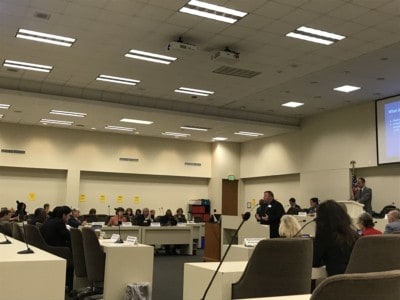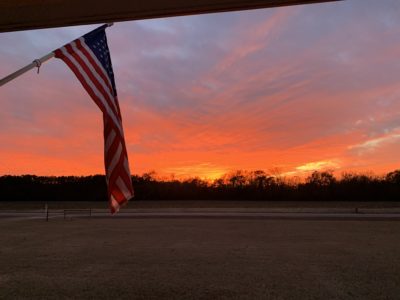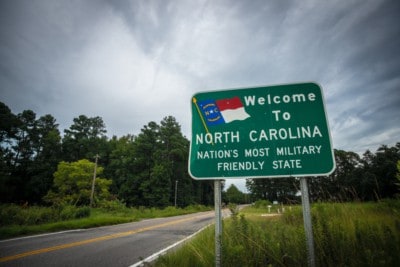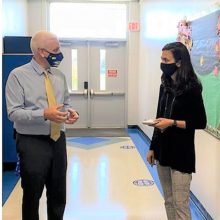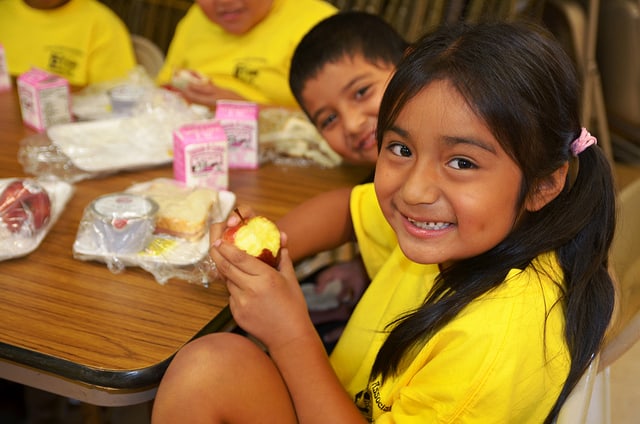
When the bell rings for the last time in June, it represents not only the end of the school year, but for many low-income students across North Carolina, it represents the end of access to free or reduced price breakfast and lunch. Eligibility for these meals is based on if family income falls at or below the Income Eligibility Guidelines, which vary depending on household size. During the 2014-2015 school year, nearly 700,000 North Carolina students received free and reduced lunches – or about 77 percent of the students eating school meals.
To continue providing these students with access to meals throughout the summer, the North Carolina Department of Public Instruction (NC DPI) administers the Summer Food Service Program with funds from the U.S. Department of Agriculture at thousands of sites across the state. Cynthia Ervin, the summer nutrition program manager at NC DPI, works alongside partners such as No Kid Hungry NC to ensure North Carolina’s children have enough to eat during the summer months as well.
Summer meals are provided in a different way than the school lunch and breakfast program that is provided during the school year. With school out for the summer, school cafeterias are no longer required to provide meals – although some still do. However, the summer meals program allows other organizations, such as nonprofits, churches, and summer camps, to receive federal reimbursement for summer meals they provide. These organizations rely on volunteers in the community to help them serve the meals and carry out programming throughout the summer.
The differences between the school and summer meals programs lead to many questions surrounding who is eligible, what kind of food is offered, and how to find a summer meal site. We answer many of those questions below.
For my child to receive a summer meal in North Carolina, does she need to qualify for free or reduced school lunch/breakfast?
No. The summer meals and snacks offered at more than 2,500 sites across North Carolina are free to children ages 18 or under. Outside of this age limit, there are no eligibility requirements for receiving summer meals.
When a student arrives at the summer meals site, will he or she have to fill out an application to receive a meal?
It depends. There are two types of summer meals sites – open and enrolled.
At open sites, there is no paperwork, no registration and no photo ID required for a child to receive a summer meal. Children under 18 only have to show up at open summer meals site in order to receive the meal. These sites operate in low-income areas where at least half of the children come from families that are eligible for free and reduced-priced meals.
At enrolled sites, children receive meals when they are enrolled in an activity program at a site where at least half of the children are eligible for free and reduced-price meals. These meals are only available to children that have gone through the formal enrollment process for that activity.
Summer camps can also participate in the summer meals program by receiving payments only for meals that are served to children who are eligible for free and reduced-price meals.
Using the resources at the bottom of this article, access the list of summer meals sites from the USDA database using a website, phone call or texting service. All of the sites that appear on this list are open sites, offering no-cost meals to anyone 18 and under. If summer camps appear on a list of sites, those camps include no-cost summer meals as well.
Are summer meals only offered at local schools?
No. Schools are not required to provide summer meals. However, schools are considered School Food Authorities (SFA) and are eligible to enroll as a summer meals site through the Seamless Summer Option. This is an expedited process that allows schools to continue using the same meal service rules and claiming procedures they used to serve meals during the regular school year.
Beyond schools, the North Carolina Department of Public Instruction also forms agreements with a variety of other sponsors to run the summer meals program. Local government agencies, public and private universities and colleges, summer camps, housing projects and faith-based or other nonprofit organizations are all eligible to sponsor a summer meals site.
Are the summer meals paid for by the church, community center, nonprofit or other organization that offers them?
No. All summer meal sites that are registered with the USDA Summer Food Service Program, and therefore follow USDA nutrition guidelines, are financially reimbursed by the federal government for every breakfast, lunch and snack they offer. Sites receive $3.77 per lunch or supper served. Rural or self-prep sites receive slightly more – $3.83 per lunch or supper. Sites can also receive financial reimbursement for operating and administrative costs.
Is it too late to register as a summer meals sponsor?
No. North Carolina will accept applications for an organization to become a summer meals sponsor until June 15th. Even after this deadline, an organization may become a summer meals site at any time during the summer by partnering with an existing sponsor in the community. A small organization that is interested in operating a summer meals site should contact the State agency and indicate interest as a site or find a local sponsor to make arrangements.
Are summer meals used by the same amount of students that use free and reduced school lunch and breakfast during the school year?
No. According to the Food Research and Action Center, only 1 in 6 six low-income children who ate a school lunch during the 2014–2015 school year were reached by the Summer Nutrition Programs in July 2015.
In North Carolina in July 2015, only 15.7 children participated in the Summer Nutrition programs for every 100 children that participated in the National School Lunch Program during the school year.
What kind of food is offered at these summer meal sites?
The USDA provides meal patterns with nutrition guidelines that summer meal sites must adhere to in order to receive federal reimbursement. Each breakfast offers one cup of milk, one fruit or vegetable, and one grain, such as a slice of bread, a muffin, or a serving of hot cereal. Each lunch offers one cup of milk, two fruits or vegetables, one grain, and one meat or meat alternative, such as turkey, beans, eggs, or cheese.
How do I figure out where my closest summer meals site is?
To find nearby summer meals sites in North Carolina:
- Text FoodNC to 877-877
- Call toll-free 1.866.3Hungry (1.866.348.6479) or 1.877.8Hambre (1.877.842.6273)
- Visit www.FNS.USDA.gov/SummerFoodRocks
How do I sign up to volunteer at a summer meals site?
Potential volunteers should access this resource on the No Kid Hungry website.
Recommended reading
